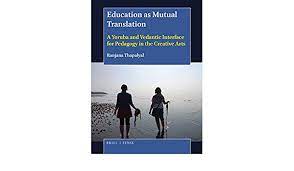In Education as Mutual Translation, the author recounts recent research conducted at a UK Art School, then examines and applies Hindu Vedantist (Ancient Indian) and Yoruba (West African) philosophical concepts of self and mutuality with others to an environment that expects high levels of individuality. Yoruba and Vedantic analyses of mind are shown to have startling resonance with each other, with Paulo Freire’s critical consciousness, and Ronald Barnett’s student being. Placing these sources in theoretical dialogue with each other the author proposes “critical autobiographic reflection” as a tool for locating cultural, political and ontological self; she suggests that a more resilient original voice emerges from awareness of society and community than from individualism, and that genuine pedagogic exchange changes student, tutor, and the work of both.
Education as Mutual Translation-A Yoruba and Vedantic interface for pedagogy in the Creative Arts
KSh 7,640.00
In Education as Mutual Translation, the author recounts recent research conducted at a UK Art School, then examines and applies Hindu Vedantist (Ancient Indian) and Yoruba (West African) philosophical concepts of self and mutuality with others to an environment that expects high levels of individuality. Yoruba and Vedantic analyses of mind are shown to have startling resonance with each other, with Paulo Freire’s critical consciousness, and Ronald Barnett’s student being. Placing these sources in theoretical dialogue with each other the author proposes “critical autobiographic reflection” as a tool for locating cultural, political and ontological self; she suggests that a more resilient original voice emerges from awareness of society and community than from individualism, and that genuine pedagogic exchange changes student, tutor, and the work of both.
| Author | Ranjana Thapalyal |
|---|
Customer Reviews
There are no reviews yet.



Be the first to review “Education as Mutual Translation-A Yoruba and Vedantic interface for pedagogy in the Creative Arts”